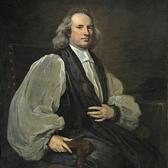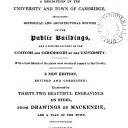A little bit of history
I was in St Albans yesterday evening for an event at St Albans School. (And by the way, after expressing concern about safety on the roads here in Cumbria earlier this week, I had plenty of grounds to complain about congestion on the M1 and knock-on effects for miles around.)
My old school has some quite remarkable historical associations - as well as also being the alma mater of Professor Stephen Hawking and being the only British school to have produced a pope (Nicholas Breakspeare, Pope Adrian IV) the school was associated with one of the very first printing presses - in fact the third printing press in English history - set up in the Abbey Gateway St Albans which is now part of the school and where yesterday's meeting took place.
That much I already knew from having paid at least some attention to various speeches on the history of the school which I heard while a pupil.
And what I learned yesterday is that one of the eight books known to have been printed on that early printing press was a copy of a latin textbook of the time known as the Elegantiolae, written by Agostino Dati, (1420–1478), and printed about 1479.
It has been suggested that the edition of this book printed for St Albans School may have been the first ever printed school textbook. At one stage there was one known surviving copy of this edition which found its way in to the library of John Moore, Bishop first of Norwich and then Ely, and thence into the Royal Library at the University of Cambridge. Another surviving copy was found at St Albans School and I saw it yesterday, where it has been provided with a very special new cover - not the wallpaper in which school textbooks are frequently wrapped, but a parchment even older and rarer.
This of course gives me an opportunity to repeat one of my favourite stories which I admit I have previously blogged about here and here. But the old ones are the best ones ...
are links to internet pages which include versions of the story and the two poems.
My old school has some quite remarkable historical associations - as well as also being the alma mater of Professor Stephen Hawking and being the only British school to have produced a pope (Nicholas Breakspeare, Pope Adrian IV) the school was associated with one of the very first printing presses - in fact the third printing press in English history - set up in the Abbey Gateway St Albans which is now part of the school and where yesterday's meeting took place.
That much I already knew from having paid at least some attention to various speeches on the history of the school which I heard while a pupil.
And what I learned yesterday is that one of the eight books known to have been printed on that early printing press was a copy of a latin textbook of the time known as the Elegantiolae, written by Agostino Dati, (1420–1478), and printed about 1479.
It has been suggested that the edition of this book printed for St Albans School may have been the first ever printed school textbook. At one stage there was one known surviving copy of this edition which found its way in to the library of John Moore, Bishop first of Norwich and then Ely, and thence into the Royal Library at the University of Cambridge. Another surviving copy was found at St Albans School and I saw it yesterday, where it has been provided with a very special new cover - not the wallpaper in which school textbooks are frequently wrapped, but a parchment even older and rarer.
This of course gives me an opportunity to repeat one of my favourite stories which I admit I have previously blogged about here and here. But the old ones are the best ones ...
John Moore was a great scholar as well as a cleric and before and during his time as bishop of Norwich and then Ely, he amassed one of the largest collections of books and papers in the 18th century world - over 30,000 items at the time of his death in 1714, which also coincided with the accession of George I.
The new King, to celebrate his coronation, caused the entire collection to be purchased for the nation for the then enormous sum of 6,000 guineas. (See item on John Moore ...)
The King then had to decide which University should have this prize: needless to say both of the Universities which existed in England at the time wanted it. (I'm mildly surprised that the Scottish ones didn't also get in on the argument.)
The King gave the collection to Cambridge University where it more than doubled the size of the University Library. The collection, including a copy of the St Albans School printing of the Elegantiolae, is still largely intact and known as the Royal library after the royal benefactor who gave it to Cambridge rather than Oxford.
This decision so infuriated the dons and students at Oxford that the government had to send a force of cavalry to quiet them down.
There are several very slightly different versions of the two brilliant poems which record the event, but the essence of the two poems is the same.
The first poem, known as Trapp's Epigram, was written by Oxford poet and Tory Dr Joseph Trapp:
"The King, observing with judicious eyes
The state of both his universities,
To Oxford sent a troop of horse, and why?
That learned body wanted loyalty;
To Cambridge books, as very well discerning
How much that loyal body wanted learning."
The state of both his universities,
To Oxford sent a troop of horse, and why?
That learned body wanted loyalty;
To Cambridge books, as very well discerning
How much that loyal body wanted learning."
The response by Sir William Browne, a Whig from St Peter's College Cambridge, is equally witty:
"The King to Oxford sent a troop of horse,
For Tories own no argument but force:
With equal skill to Cambridge books he sent,
For Whigs admit no force but argument."
For Tories own no argument but force:
With equal skill to Cambridge books he sent,
For Whigs admit no force but argument."
Here
and here
are links to internet pages which include versions of the story and the two poems.



Comments